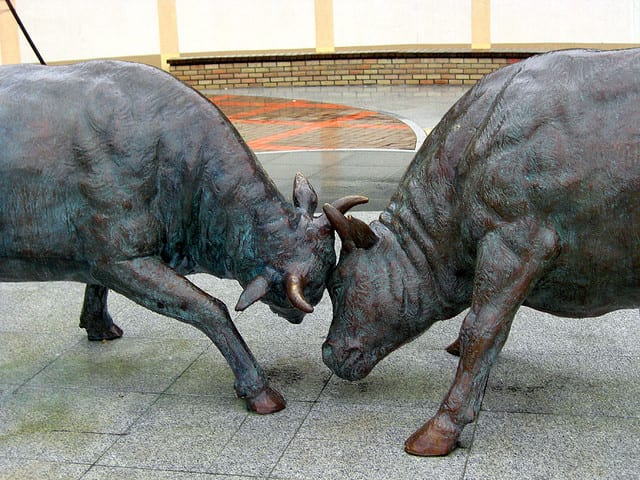This is where it gets really interesting. Since I first engaged in the climate debate in the late 1980’s it’s all been fairly slow and predictable. Environmentalists argued for action, big business resisted and government acted as the referee, deciding the policy winners.
As I look around today, however, I see a shift underway from ‘environment vs business’ to ‘business vs business’. The global impact on both policy and investment decisions could be revolutionary.
While there has always been some big business advocacy for climate action it has, with a few exceptions, been largely driven by companies’ sense of social responsibility rather than their immediate economic interest. Businesses have called for action and CEO’s have signed on to joint statements, all with genuine intent. But it has always lacked the urgency and resources indicating a core business issue.
This hasn’t cut it in the debate because those businesses opposing action see it as a fight for survival and therefore approach their opposition in a far more aggressive, strategic and well-resourced way. In a fight between corporate responsibility and companies fighting for economic existence, the latter will always triumph. And in this lies the key to why the current shift is so important.
An increasing number of companies and business leaders are beginning to recognize that climate change threatens their economic success, in some cases their survival. As a concept this is not new. The negative economic impacts of climate change have long been clear, both broadly and on specific sectors. The difference now is two fold – timing and tangibility.
After two decades working inside large corporates on sustainability I’ve developed a good sense of what drives real change. No matter how logical and convincing arguments are about economic impacts, unless they are both tangible – understandable and “felt” in the day-to-day business – and sufficiently close in timing to count, business just doesn’t act at scale. Timing doesn’t have to be this quarter’s earnings, that’s a myth, but it does need to impact major business decisions within 5 – 10 years rather than some vague concept of “future decades”.
It also needs to be tangible. People who run companies are busy and their focus is scattered over many issues. Getting serious attention, let alone action, is challenging for theoretical risks and opportunities no matter how correct the analysis. So issues being tangible – something they can relate to in their current business structure – is key. They need to see impacts on supply chains, new demands from customers, shifts in the value of key assets or changes in how financiers or investors rate risk.
In recent years the economic impacts of both physical climate change, and the market shift to lower carbon energy, have started to satisfy both these criteria.
The former of these is the least surprising, with climate variability and extreme weather disrupting food supply and supply chains. The direct causality from climate change is not the point, the issue is timing and tangibility. Business leaders see the 2011 flooding in Thailand, which sent supply chain impacts rippling through the global economy, or food price spikes triggering unrest and increasing costs and a light goes on – “so this is what they’re talking about – but it will get much worse”.
Of perhaps even greater significance are the economic implications of the transition, now firmly underway, to a low carbon economy. Until recently, this was theoretical, with the focus on a multi decade transition to new energy sources failing both the timing and tangibility test for most.
While there have been steadily growing investments in renewables these posed no significant threat to the market incumbents and had little impact on the core investment strategy for fund managers. This has now shifted in material and tangible ways.
In my next column I will address this in more detail but the core message is clear. In the shift to renewables, particularly solar, and the growing potential for energy storage and electric cars, we see disruptive change that could profoundly transform global markets. The finance sector is responding with major shifts in the market capitalization of companies – responding to issues like the potential death spiral of the traditional utilities and coal’s decline now looking terminal.
Some are even arguing that, comparable to the way digital and information technology drove whole sectors out of business, renewable energy, electric cars and storage technologies will make the coal and oil industry obsolete by 2030.
While all this has profound implications for the energy and transport sectors, there is something even bigger at play for us all. As significant sections of the elite realise their future prosperity and power is threatened by climate change, or enhanced by the resulting market shifts, the balance of power in the whole global system will shift.
From the David vs. Goliath of the ‘economy vs environment’ debate, it will become ‘my economy vs. your economy’, with multi-trillion dollar impacts for the winners and losers. And with a battle between Goliath and Goliath, business leaders will increasingly have to choose sides.
Now that will be interesting.








